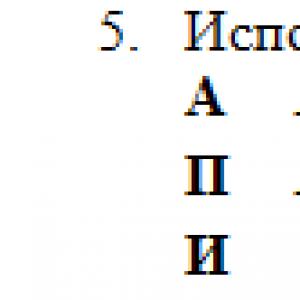Civil Aviation Technical College. Omsk Flight Technical College of Civil Aviation
In the section on the question coordinating and subordinating conjunctions...which are coordinating and which are subordinating? given by the author Marusya the best answer is if, as, as if, exactly, that, so that and others. First in compound sentences, the second - in complex ones.
Reply from Advise[guru]
Coordinating conjunctions can connect homogeneous members of a sentence and simple sentences as part of a complex one, and subordinating conjunctions can only connect sentences (as part of complex ones).
Reply from Vulgar[active]
and, yes (and), not only--but and, as--so and, but, but, however, but, or, either, that, not that--not because, because, since, in view of the fact that, thanks to the fact that, due to the fact that, so that, when, barely, if, as if, as if, exactly, that, in order
Reply from Dmitry Aprelov[newbie]
Coordinating: Adversative: Ah, but, but, however... Disjunctive: Or, either, that... that, not that... not that. Conjunctive: And, neither nor, not only but and, as so and.
Reply from Eurovision[newbie]
Subordinating: and, a, but, yes, however, but... Subordinating: because, because, since, so that, when, barely, if, if, as, as if, exactly, that, while ...
Reply from Mishanya Strausov[newbie]
1. COORDINATING: and, yes (and), not only--but and, as--so and, and, but, however, but, or, either, that, not that--not that, etc.2 . SUBORDERING: because, because, since, due to the fact that, due to the fact that, due to the fact that, so that, when, barely, if,
Reply from Olesya Pyrlya[newbie]
Nnn
Reply from Gonchar Evgeniy[newbie]
ahh
Reply from Ora Petrash[active]
1. COORDINATING: and, yes (and), not only--but and, as--so and, and, but, however, but, or, either, that, not that--not that, etc.2 . SUBORDERING: because, because, since, due to the fact that, due to the fact that, due to the fact that, so that, when, barely, if,
List of Fairy Tail episodes on Wikipedia
List of Fairy Tail episodes
List of No. 1 singles in South Korea in 2015 by Gaon International on Wikipedia
Look at the Wikipedia article about List of No. 1 singles in South Korea in 2015 Gaon International
Union part of speech on Wikipedia
Look at the Wikipedia article about the Union part of speech
Subordinating conjunctions according to their meaning they are divided into two groups: functional-syntactic and semantic.
Functional-syntactic conjunctions indicate the syntactic dependence of the subordinate part on the main one, without specifying the nature of this dependence. Valgina N. S. emphasizes that this has indefinite semantics, i.e. it can be used in various types of subordinate clauses, these include conjunctions What, to, How .
- He didn't hear
- How a greedy wave rose. (Adverbial explanatory clause.)
- (A.S. Pushkin)
- Why do you need your blackamoor?
- The young one loves Desdemona,
- How does the month love darkness at night? (Comparative clause.)
- (A.S. Pushkin)
- His deserted corner
- I rented it out How The deadline has passed. (Adverbial tense.)
- (A.S. Pushkin)
Semantic conjunctions serve not only to formally attach a subordinate clause to the main one, but also to express certain semantic relations.
Semantic subordinating conjunctions are divided into the following groups:
1. Temporary alliances: How, When, barely, Bye, only, only, as soon as, before, after, since. Express the temporal relationship between two events and situations.
- Nice, When there are people in the world who want to help.
- (P. A. Pavlenko)
- When When you're in a hurry, the road always seems longer.
- (D. N. Mamin-Sibiryak)
- As soon as I entered the edge of the forest, How I immediately came across wild boars...
- (V.K. Arsenyev)
2. Explanatory conjunctions: What, to, How, as if. Express explanatory relationships.
- I told the boys What got lost and sat down with them.
- (I. S. Turgenev)
- I want,
- so that to the bayonet
- equalized the feather.
- (V.V. Mayakovsky)
- Children feel Who loves them.
Galkina-Fedoruk E.M., Raspopov I.P. and Lomov A.M. do not classify explanatory conjunctions as semantic (they are classified as semantic by Rosenthal D.E. and Telenkova M.A.).
3. Target alliances: to, if only, if only, so that(obsolete), in order to, so that, for the purpose of. Convey target relationships. The subordinate clause explains the content of the main part of a complex sentence.
- To To love music, you must first listen to it.
- (D. D. Shostakovich)
- Everyone was silent to hear the rustling of flowers.
4. Causal conjunctions: because (That), because, for, because, due to the fact that, thanks to the fact that, due to the fact that, due to the fact that, due to the fact that, due to the fact that, because, due to the fact that. Express causal relationships. The basis or motive is indicated in the subordinate part, and the consequence in the main part.
- A because the upset mother was silent, That Chuk and Gek were silent too.
- (A.P. Gaidar)
- Because the clouds almost touched the tops of the birches, it was quiet and warm on the ground.
- (K. G. Paustovsky)
5. Conditional conjunctions: If, if, if, once, if only, When, how soon. The conditional relations indicated in the subordinate part are conveyed, and the result is shown in the main part.
- How well could all the people in the world live, If if only they wanted If If only they understood!
- (A. A. Fadeev)
- When two people quarrel - both are always to blame.
- (L.N. Tolstoy)
6. Concessive alliances - Although, let, let him, otherwise, for nothing that, meanwhile, despite the fact that , as well as pronominal-conjunctive combinations no matter how much, no matter how - express concessionary relations. The subordinate clause describes a situation or event in spite of which another event occurs.
- This morning in the steppe it was quiet, cloudy, despite the fact that the sun has risen.
- (L.N. Tolstoy)
- No, there's not enough of you for everyone,
- At least what kind of general are you?
- (A. T. Tvardovsky)
- At least he couldn't have looked more diligently,
- But also traces of the former Tatyana
- Onegin could not find it.
- (A.S. Pushkin)
7. Comparative unions: How, how, as if, as if, as if, exactly, than, as if, just like. Comparative relations are conveyed through a complex sentence, which describes the similarity of two events, situations - real and expected.
- Just like the impatient young man is waiting for the hour of the meeting, I was waiting for the hour of the morning.
- (M. A. Bulgakov)
- Cool summer has arrived
- As if new life has begun.
- (A. A. Akhmatova)
8. Investigative unions: So. The subordinate part conveys relations expressing the consequence, result, conclusions, while the main part expresses the cause, the basis.
- The house stood on a slope, So The windows to the garden were very low from the ground...
- (S. T. Aksakov)
- The rain has stopped So we can go for a walk.
Many linguists are inclined to believe that investigative relations are conveyed only by a single conjunction So (Lekant P.A.). Meanwhile, Babaytseva V.V., Maksimov L.Yu., Vinogradov V.V. also include the union in this group to the point that .
- AND before that I suddenly felt ashamed What literally tears flowed down my cheeks...
- (F. M. Dostoevsky)
Subordinating conjunctions and allied words are the connecting link between the main and dependent clauses in a complex sentence (SPP). Here is a list of allied words and subordinating conjunctions depending on the meaning of the subordinate clause they attach.
Subordinating conjunctions
Unlike conjunctions, words of the auxiliary part of speech, they perform the role of a conjunction and at the same time remain full members of the sentence.
They asked me who I was, first in Portuguese, then in Spanish, then in French, but I did not know any of these languages (Daniel Defoe. Robinson Crusoe).
- (Who?) I- this is the subject;
- (what does it say about me?) who is this- compound nominal predicate.
Let's list the allied words - pronouns:
- Who;
- What;
- Which;
- what;
- which;
- whose;
- how much (how much).
Examples of sentences with allied words - pronouns
Let me ask you who has the honor of being first? (Arthur Conan Doyle. Hound of the Baskervilles).
Berlioz looked around sadly, not understanding what frightened him (M. N. Bulgakov. The Master and Margarita).
Sometimes a master, no matter how angry he was, would calm down in her presence and talk graciously to me (A.S. Pushkin. Belkin’s Stories).
There was no answer, except for the general answer that life gives to all the most complex and insoluble questions (Leo Tolstoy. Anna Karenina).
But I didn’t know and couldn’t find out what this period was (Anatoly Rybakov. Children of the Arbat).
Is he really doomed to death, this young man with a beautiful strong body, a young man whose voice sounds like the call of a bugle and the ringing of weapons? (Jack London. The Iron Heel).
But come on, how much unspoiled, childish things there are in her (Boris Pasternak. Doctor Zhivago).
But he was already in such a rage that he did not notice how futile his efforts were (Jack London. The Hearts of Three).
Conjunctive words are pronominal adverbs:
- Where;
- For what;
- How;
- When;
- Where;
- from where;
- why;
- why;
- how much.
Examples of sentences with allied words - adverbs
A rich collection of pistols was the only luxury of the poor hut where he lived (A.S. Pushkin. Belkin's Tales).
They guessed why the tsar called to the palace (Alexey Tolstoy. Peter the Great).
It is unknown how he did it, but only his nose sounded like a trumpet (N.V. Gogol. Dead Souls).
And when he opened them, he saw that it was all over, the haze dissolved, the checkered one disappeared, and at the same time the blunt needle jumped out of the heart (M. N. Bulgakov. The Master and Margarita).
He didn’t know where he was walking, spreading his legs wide, but his legs knew very well where they were taking him (Boris Pasternak. Doctor Zhivago).
Two were already driving forward to the place where they were supposed to let them in (Leo Tolstoy. Anna Karenina).
Maude released his hand, causing his fingers to loosen slightly and the pencil to fall out (Jack London. The Sea Wolf).
Then he lost patience and began to grumble why he was always forced to do what he didn’t want (Mark Twain. The Adventures of Tom Sawyer).
Yura understood how much he owed his uncle the general qualities of his character (Boris Pasternak. Doctor Zhivago).
How to distinguish conjunctions from allied words

Subordinates conjunctions are not members of the subordinate clause, but serve only to attach subordinate clauses to the main or other subordinate clause.
For example:
It is bitter to think that life will pass without grief and without happiness, in the bustle of daily worries. (I. Bunin.)
Let's compare:
My father guessed what was in my soul (Daniel Defoe. Robinson Crusoe).
Conjunctive words not only attach subordinate clauses to the main (or other subordinate clause), but also are members of subordinate clauses.
For example:
In autumn, birds fly to places where it is always warm.
I don't know why he did it.
In these sentences the connecting words "Where" And "For what" are circumstances.







